Is It Allergies or a Cold?
Allergies affect more than 50 million people in the United States each year, with many individuals suffering from allergic rhinitis. Also known as hay fever, its symptoms are as common as they are annoying — sneezing, runny nose, and itchy, watering eyes to name a few.1
While some symptoms overlap between allergies and a cold, you may notice some key differences. Colds are contagious and people often unwittingly infect others for two days before symptoms appear. A low-grade fever and aches and pains may accompany them. This common illness may also develop gradually over a couple days.2
On the other hand, viruses don’t cause allergies, so you can’t pass allergies on to anyone else. They occur when the body initially encounters a normally harmless substance and creates antibodies to it. When the body encounters the substance again, the existing antibodies tell the immune system to send chemicals such as histamine into the bloodstream to fight the invader. The immune response causes unpleasant allergy symptoms, and they often come on suddenly rather than gradually.3
Allergy Causes and Risk Factors
Allergic rhinitis typically comes in two forms: seasonal and perennial. As its name suggests, seasonal allergies strike at predicted times of the year, most often in the spring, summer, or early fall. The main culprits tend to be pollens from grasses, trees, and weeds as well as mold spores transported through the air.
People with perennial allergies suffer all year. Triggers tend to be exposures encountered during everyday life such as animal dander, dust mites, cockroaches, or mold spores rather than outdoor greenery or conditions.4
While allergies are more likely to strike during childhood, they can develop at any time during a person’s lifetime. Reactions can vary from minor to severe.5
Unfortunately, you can’t control most of the risk factors for developing hay fever. People with existing allergies, asthma, or eczema are more likely to have hay fever. And if a parent, sibling or other blood relative has allergies or asthma, your chance of getting hay fever increases. But you can control one risk factor by spending less time exposed to allergens like animal dander or dust mites.
Allergies, Sinuses, and How They Can Cause Jaw Pain
As any sufferer knows, allergies can wreak havoc on your body. In addition to the well-known sneezing, sniffling, and red watering eyes, you may experience postnasal drip, coughing, and fatigue.6 Allergies can also clog the sinuses. Because of that, they could be the source of your nagging jaw pain.7
You probably identify sinus problems with nasal pressure. But allergies can cause lower jaw pain as well as the feeling of general pressure, especially if maxillary sinuses are obstructed. Inflamed and swollen sinuses can affect a number of areas of the face and head and result in issues ranging from headaches and earaches to facial tenderness near the eyes and nose that radiates to the jaw.8
It’s possible that seasonal allergies could cause jaw pain in other ways, although more research is needed on the subject. Frequent sneezing and coughing force the mouth open which could lead to muscle tension and overuse strain and create issues with the jaw. Similarly, a stuffy nose may make you breathe through your mouth at night. If your jaw is strained open all night, it makes sense that you could wake up with jaw discomfort.9
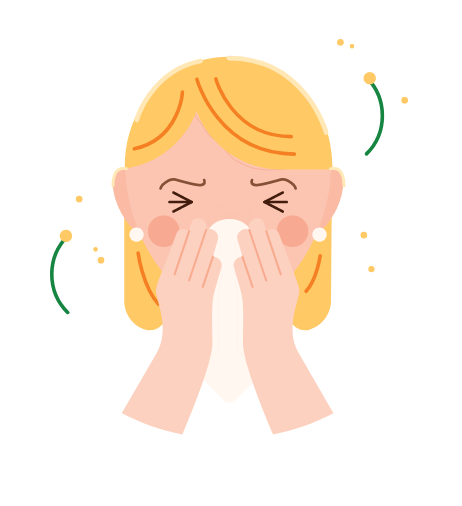
Allergies may cause the sinuses and nasal passages to swell and fill with fluid, causing a headache or facial pain.
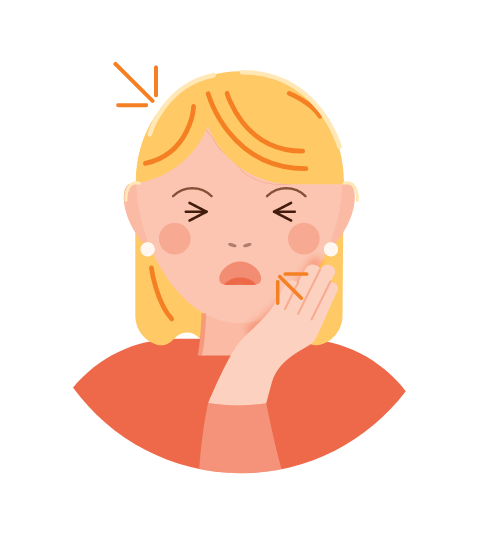
Your cheeks may become tender, and the pain may radiate to your jaw and teeth.
The top of your head may also hurt.

The pain can be dull to intense.
It’s usually worse when you lie down and better when you sit or stand upright.
source: acaai.org
And for people who have a temporomandibular joint disorder (diagnosed or not), it’s possible that allergies could exacerbate it and cause increased jaw pain. However, the sinuses are the key way allergies cause jaw pain.
The Sinuses Explained
Many parts of the body get a lot of love. We try to eat right and exercise for our hearts and stay engaged with life mentally and socially to keep our minds sharp as we age. But people often neglect their sinuses. The sinuses may only become your focus of attention if a problem occurs. But it’s worth understanding more about your sinuses, and that’s especially true if you experience jaw pain, because sinus pressure and pain can radiate all over the face.
Sinuses are also called paranasal sinuses. They’re air-filled pockets or cavities in the skull and facial bones that connect to the nose through an opening known as an ostium.
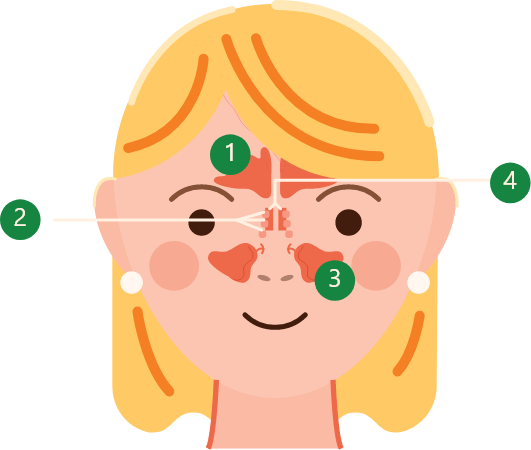
There are 4 types of sinuses, which are all found in pairs, with one on each side of the face.
1. Frontal sinuses
Large cavities in the frontal bone which create the bottom part of the forehead and extend over the eyebrows and eye sockets. The size and shape varies in different people.
2. Ethmoid sinuses
Multiple small cavities located between the nose and eyes.
3. Maxillary sinuses
Largest type with three pyramid-shaped cavities pointing in, down, and to the side.
4. Sphenoid sinuses
Located in the sphenoid bone between the eyes and behind the nose.
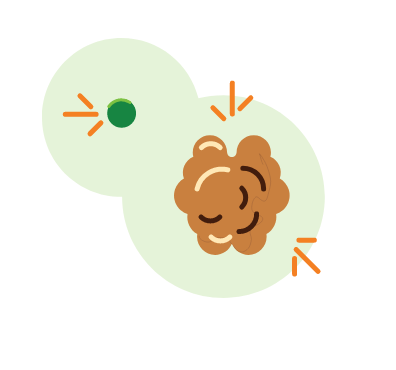
With the exception of the frontal sinuses, each type of sinus is the size of a pea when a person is born and grows along with the individual.
At full capacity they’re approximately the dimensions of a walnut.
Sinuses serve many important purposes.
Reduce the weight of the head
Help create a person’s recognizable voice and give it resonance
Prevent injuries resulting from impacts
Moisten the breath to keep the nose from drying out
Insulate and protect the nose from quick temperature changes
Catch dust, allergens, and pathogens to keep the body healthy
Usually when we hear about cavities, it’s when we get bad news at the dentist’s office, but sinus cavities are our allies. Check out our 6 Things to Know About Sinuses page to learn about the remarkable role they play to keep us well and healthy.
Like many parts of the body, sinuses aren’t immune from issues. Allergic sinusitis typically comes with the usual allergy symptoms such as sneezing, nasal congestion, and itchy eyes, nose, and throat.10 Allergy headaches can also occur with facial discomfort in the sinus area. Pain can be located throughout the region or sometimes located on just one side.11
Keeping Sinuses Healthy
The good news is you can take steps to keep your sinuses healthy, which may help alleviate and prevent jaw pain. One action you can take is to manage allergies to keep your symptoms under control. Allergies can cause inflammation of the nose and sinuses which in turn blocks mucus from draining and may lead to an infection.
In addition, consider using nasal saline sprays to keep your nose moist. This practice ensures the cilia will work at their optimum level to clear the airways and remove debris. You may also want to irrigate your sinuses with a saline sinus wash to add moisture and flush out dust, pollen, and other intruders. 12 13
Beware of irritants such as pollution and smoke. The chlorine found in chlorinated pools may also irritate and inflame your nasal passages and sinuses. If possible, opt to swim in saltwater pools or natural bodies of water to avoid excess exposure to chlorine.14
Maintaining good health overall can also help keep sinus issues at bay. Eat a healthy diet, exercise regularly, get enough sleep, and manage stress to boost the immune system and keep colds and flus at bay. Avoid taking antibiotics or steroids if possible as they disrupt the microbiota in the sinuses and may allow pathogens to proliferate.15 Finally, it may sound obvious but don’t forget to wash your hands. Handwashing can play a large role in reducing illness and sinus issues.16
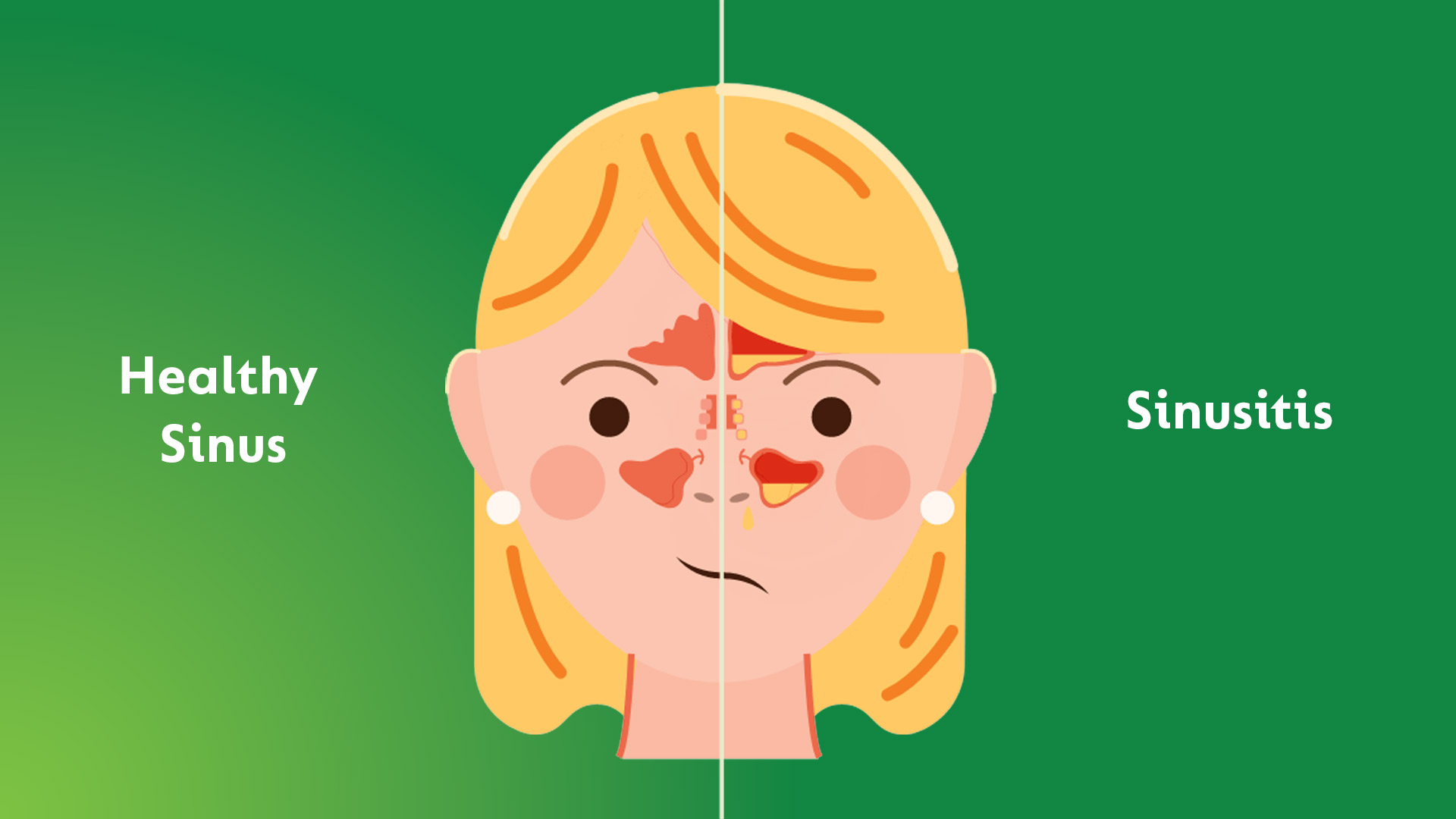
Keep your sinuses healthy with these tips.
Use a nasal spray to moisten your nose.
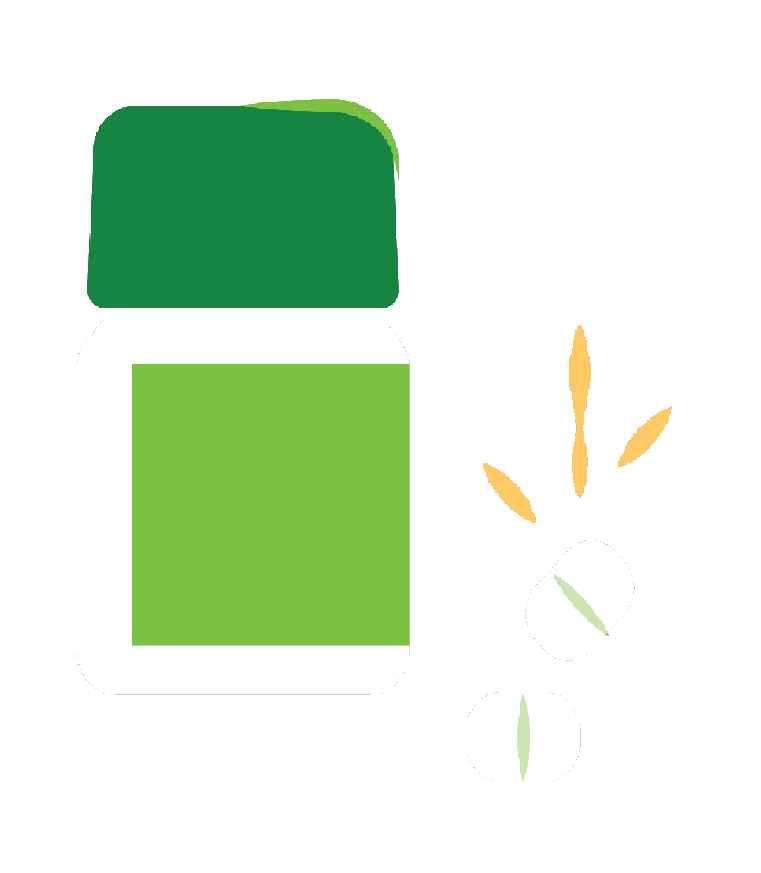
Treat your allergies to keep symptoms under control.
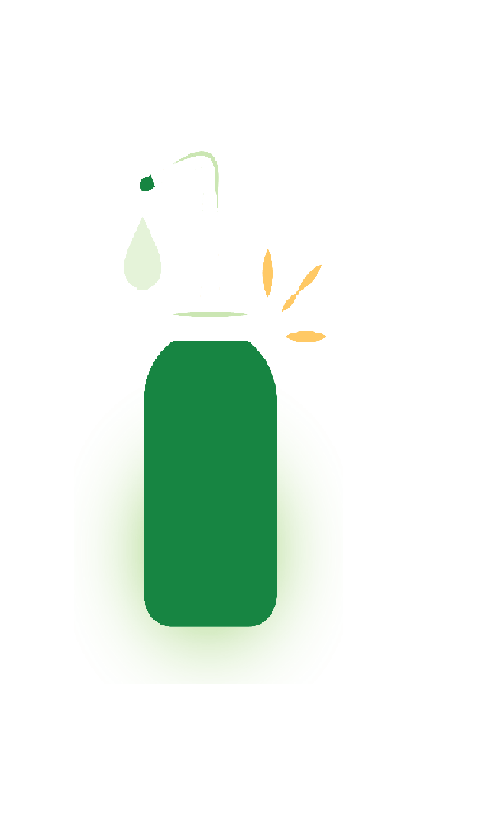
Irrigate your sinuses with a saline rinse.
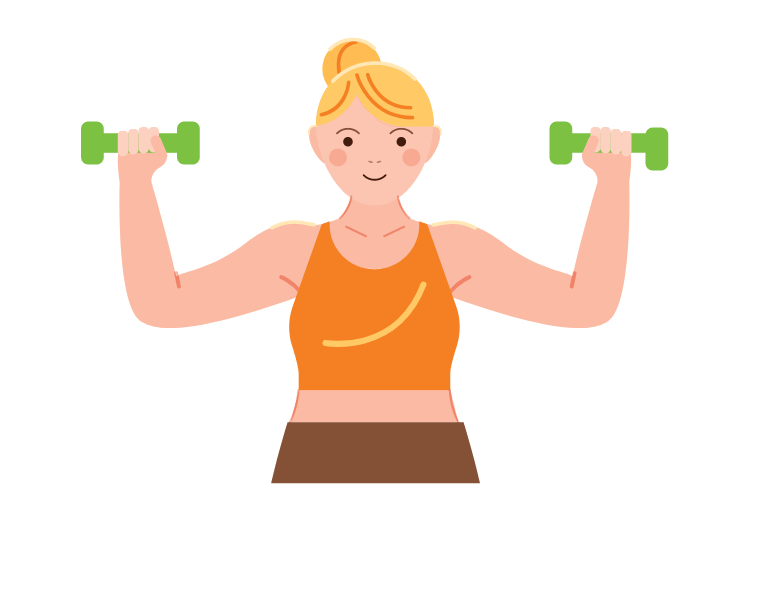
Eat a healthy diet, exercise, and get plenty of sleep.
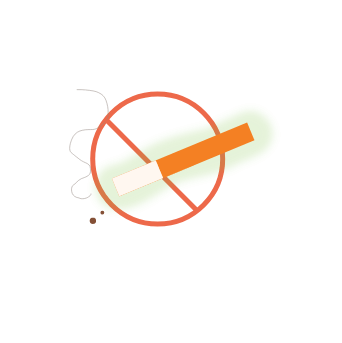
Avoid irritants, such as pollution, smoke, and chlorinated water.

Avoid taking steroids or antibiotics, which can disrupt the microbiota in the sinuses.

Wash your hands often to avoid transmitting cold and flus.
Find the Right Treatment to Ease Your Jaw Pain
If you have severe or long-lasting jaw pain, you may want to talk to a medical professional. But if you suffer from jaw discomfort and allergies, some simple precautions may help you smile — without pain — in no time.

Kristen Stewart is a freelance writer specializing in health and lifestyle topics. She lives in New Jersey with her husband, three kids and two very needy cats.
References
https://www.zyrtec.com/allergy-guide/understanding-allergies/symptoms/allergies-or-cold
https://www.mayoclinic.org/diseases-conditions/hay-fever/symptoms-causes/syc-20373039
https://www.mayoclinic.org/diseases-conditions/allergies/symptoms-causes/syc-20351497
https://www.mayoclinic.org/diseases-conditions/hay-fever/symptoms-causes/syc-20373039
https://www.newsmile4u.com/blog/allergy-symptoms-can-hide-tmj/
https://blogs.bcm.edu/2014/06/25/ten-tips-to-avoid-sinus-infections/
https://blogs.bcm.edu/2014/06/25/ten-tips-to-avoid-sinus-infections/
Links to other parties’ articles and websites are provided for convenience only. Kenvue is not responsible for their content.

